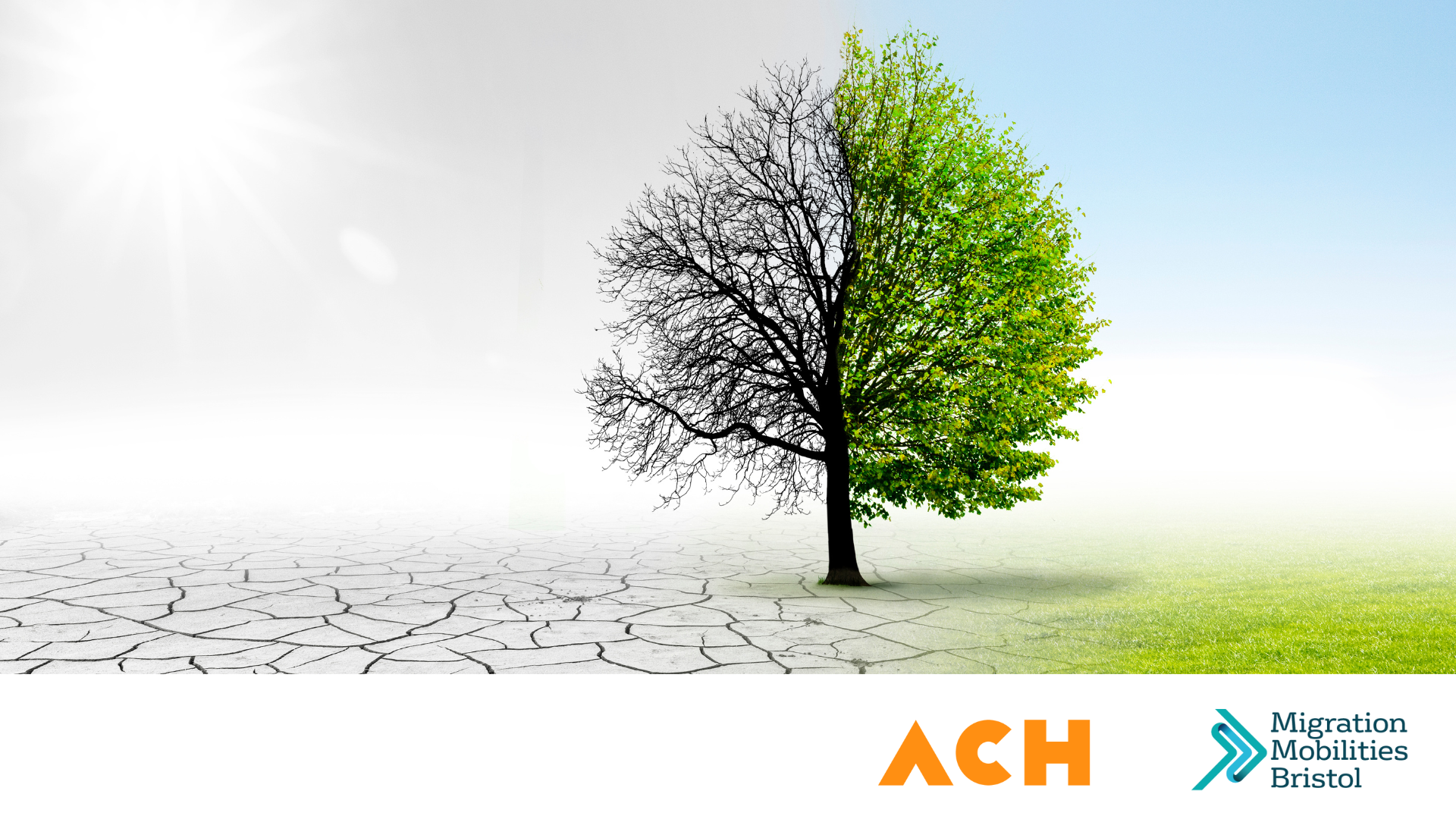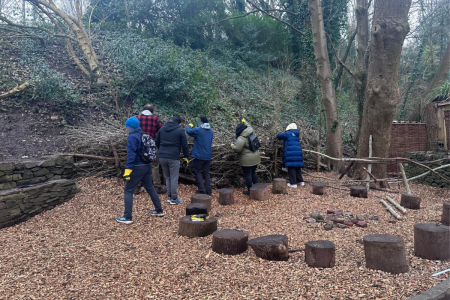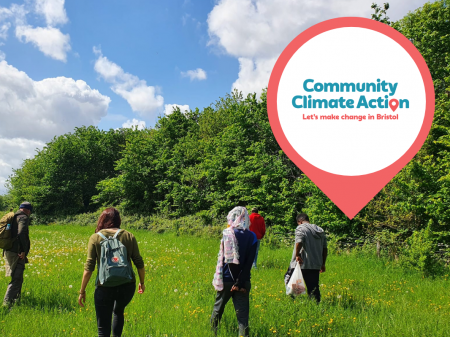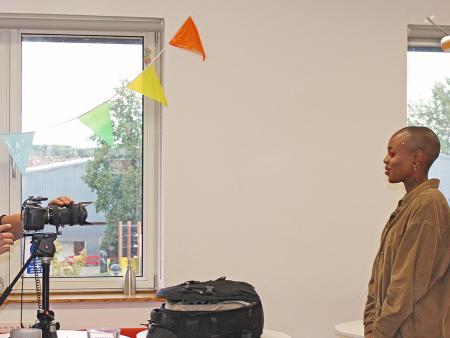
ACH and MMB Seminar Series: Migration and Climate Change
We are delighted to have run our latest seminar in our series of online seminars in collaboration with Migration Mobilities Bristol (MMB), a specialist Research Institute at the University of Bristol, on the 5th October.
Our seminar series aims to bridge the gap between policy, research and delivery in the refugee and migration sector.
Keep reading to find out more about our latest seminar, which delved into the interconnections between migration and climate change.
Our latest seminar explored the interconnections between migration and climate change, delving deeper into local, national and international themes and issues. From international law to local climate inequalities such as air quality, refugee and migrant communities are often the most affected by the climate crisis.
We were thrilled to be joined by an expert panel, chaired by Ann Singleton, Reader in Migration Policy, Migration Mobilities Research Institute, University of Bristol. Our panel included:
- Dr Laura DeVito, Senior Research Fellow in Geography and Environmental Management at UWE
- Dr Kathryn Allinson, Lecturer in law, University of Bristol
- Dr Alice Venn, Lecturer in law, University of Bristol
- Tom Dixon, Research and Project Lead at ACH
Migration due to Climate Change: A last resort adaptation?
Our first speaker, Dr Laura DeVito, gave us an invaluable insight into the global climate emergency and international, national and local responses to the crisis.
‘The intergovernmental Panel on Climate Change, which is the most author body that gathers all the science available on climate change and provides recommendations to policy makers. In its last report last year, probably the most strongly worded report thus far, said that it is absolutely unequivocal that humans, with our activities, with our productions and with our behaviors are having a massive influence on the atmosphere, on the ocean and on our land.
Human activities are absolutely linked to climate change. And it's absolutely imperative that we take action with a sense of urgency and real commitment.’ – Dr Laura DeVito
Laura took us through some of the global responses to climate change, which can fall under one of two categories:
Mitigation - Refers to efforts to reduce or prevent emission of greenhouse gases or to remove these gases from the atmosphere.
Adaptation - Adaptation means anticipating the adverse effects of climate change and taking appropriate actions to prevent or minimise the damage they can cause, or taking advantage of opportunities that may arise.
Laura spoke to us about the need for both a mitigation and an adaptation response to climate change, in order to reduce it’s effects on people and the environment. She spoke about how forced migration due to climate change can be categorised as a last resort adaptation.
‘Climate change can interact with other socioeconomic, political and cultural factors that can be linked to migration, but this relation is not straightforward. Migration can be seen as a last resort adaptation action.’ – Dr Laura DeVito.
Dr Laura DeVito finished by making the point that climate mitigation policies do exist, and with the right interventions by local, national and international policymakers, we can globally mitigate the effects of climate change.
‘We know where the problem is. We know how to deal with it, but we don't implement solutions enough. There are a wide range of options that national governments, local authorities, communities, organizations, industries, can work towards both net zeros and adaptation roles.’ – Dr Laura DeVito.
Seeking Sanctuary from Climate Change?: Perspectives from International Law
Our next speaker was Dr Kathryn Allinson, Lecturer in Law at the University of Bristol. Kathryn told the audience how important it is to note that climate change will affect communities across the world differently.
‘Climate change is not going to affect us all equally. It is communities who are already the most vulnerable and who have contributed the least to global emissions that are going to be hit the hardest by climate change impacts.
Research has demonstrated that displacement from climate change occurs because it exacerbates existing vulnerabilities and reinforces inequalities such as poverty, food insecurity, existing conflict and persecution. We know that as climate change impacts increase, it will lead to greater levels of movement as vulnerabilities are further exacerbated and inequalities deepen.’ – Dr Kathryn Allinson
Kathryn went on to highlight that under international law on refugees, climate change does not constitute grounds for seeking asylum. This is because climate change cannot be conflated with persecution, which requires an assault on a person’s human rights.
Kathryn also highlighted the challenge of the temporality of climate change. Climate change is undeniable, but it’s effects are slow moving. This makes it difficult to prove climate change as the undisputed cause of a person’s forced migration.
‘Under Article one A of the 1951, Refugee Convention, climate related displacement does not constitute a ground for international protection. A refugee must have a well founded fear of persecution. And persecution requires an egregious violation of human rights, which is assessed in light of the nature of the right and the severity of the violation.’ – Dr Kathryn Allinson
Although the 1951 Refugee Convention does not include climate change as grounds for seeking asylum, Kathryn illustrated that the solution may not lie in the creation of a Climate Change Displacement International Treaty. In fact, Kathryn highlighted the need for legal local and regional migration routes that allow migration to flow.
‘We need an increase in access to legal pathways for migration that are open to all, not just the highly skilled, to ensure those who are most vulnerable have access to pathways to seek work within their country or region.’ – Dr Kathryn Allinson
Dr Alice Venn then took us through some of the international treaties on climate change, including the Paris Agreement and the UN Framework Convention on Climate Change. Alice explained that these international treaties do not include any legally binding obligations in relation to climate change.
‘The framing of loss and damage has always been quite carefully considered in climate negotiations, and has often been a sticking point between state parties. States are very reticent to put in place any legal duties or obligations, and particularly no duty to provide compensation for climate loss and damage.’ – Dr Alice Venn
As such, no international frameworks for climate migration have been put in place, but rather, states are encouraged to develop their own policies and laws to address the impacts of climate migration and displacement.
Creating an equitable climate response
Tom Dixon then spoke about the impact of climate change on refugee and migrant communities in the UK, which manifests in multiple interconnected ways.
‘A couple of years ago, I was talking with one of our Sudanese tenants in Bristol about how he was having to increase the amount of money he was sending back to his family who remained in Sudan. Because there had been a drought in Sudan, the crops had failed, and the family was struggling. This was directly impacting him and his standard of living in the UK as he was essentially supporting more and more people back home who were unable to support themselves because of those impacts of climate change.’ – Tom Dixon
Tom discussed that although refugee and migrant communities in the UK may be more affected by climate change, they are less likely to be contributing to greenhouse emissions.
‘We [ACH] commissioned, as part of our Community Climate Acton Project with the National Lottery Community Fund, and the Centre for Sustainable Energy, we produced a report on the carbon footprints of our service users, our residents in Bristol properties and found they were 70% lower [carbon footprint] than the Bristol average.’ – Tom Dixon
This presents an inequality for the communities ACH works with, who, the report found, are unlikely to own cars or take part in high-emissions activities like international travel. Within cities themselves, refugee and migrant communities can be more at risk of environmental degradation. Tom illustrated the clear inequalities faced by many people from a refugee and migrant background when faced with the challenge of climate change.
Discover more...
Want to learn more on this topic? Access the seminar slides here.
Keep up-to-date with the latest news and learnings from the ACH MMB Seminar Series on our website.


